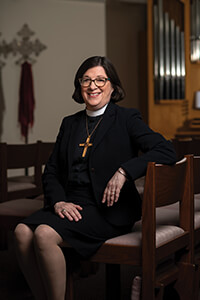I was a stranger
October 31, 2016
I was a stranger and you welcomed me … (Matthew 25:35).
Today there are more than 60 million displaced people in the world, more than at any time since World War II. From Syria, South Sudan, Central African Republic, Guatemala, Honduras, El Salvador, Somalia, Afghanistan and Colombia, people are fleeing for their lives from war, famine, gang violence, crushing poverty, drought and floods. Parents make the wrenching choice to send their children away with the hope that the possibility of a better life in a new country outweighs the violence of their home countries and the perils of the journey.
It seems the whole world is on the move.
Migration has been part of the story of the people of God from the beginning. Adam and Eve were expelled from the garden, and God sent Abram and Sarai from their homeland to a new land. Joseph’s brothers and father were refugees in Egypt. Israel wandered in the wilderness for 40 years after God liberated them from oppression and infanticide. The people of God suffered bitter exile in Babylon after they were forced from Judah by war and ethnic cleansing.
The memory of migration, forced exile, of being the stranger stayed with the people of God through the centuries and became part of their confession of faith: “… you shall make this response before the Lord your God: ‘A wandering Aramean was my ancestor; he went down into Egypt and lived there as an alien …” (Deuteronomy 26:5).
The experience of God’s people compelled Israel to give special care to the stranger. “When an alien resides with you in your land, you shall not oppress the alien. The alien who resides with you shall be to you as the citizen among you; you shall love the alien as yourself, for you were aliens in the land of Egypt: I am the Lord your God” (Leviticus 19:33-34).
Jesus also experienced forced migration. We read in Matthew 2:13-15 that the holy family fled for their lives from Israel into Egypt. And during the years of his earthly ministry Jesus had no permanent home. “And Jesus said to him, ‘Foxes have holes, and birds of the air have nests; but the Son of Man has nowhere to lay his head’ ” (Matthew 8:20).
Our Lord not only commended us to welcome the stranger, Jesus made it clear that when we welcome the stranger we welcome him.
Lately in our country there is a lot of anxiety about migrants and strangers. They are too often portrayed as a threat. They are the others. They need to be monitored. They don’t belong here. This is our home. This is our country. We belong here.
When we look at the world in this way it isn’t possible to see that we, too, are on a journey; we, too, were once no people; we, too, are only passing through. The author of Hebrews recounting the history of salvation makes this clear when speaking about our ancestors in faith:
“All these died in faith without having received the promises, but from a distance they saw and greeted them. They confessed that they were strangers and foreigners on the earth, for people who speak in this way make it clear they are seeking a homeland. If they had been thinking of the land that they left behind, they would have had opportunity to return. But as it is, they desire a better country, that is, a heavenly one” (Hebrews 11:13-16).
We don’t have a continuing home on earth. We are all migrants. Let us welcome the stranger, seeing him or her as a fellow traveler, a companion on the way.
And here’s a song for the road:
I fear in the dark and the doubt of my journey;
but courage will come with the sound
of your steps by my side.
And with all of the family you saved by your love,
we’ll sing to your dawn at the end of our journey
(Evangelical Lutheran Worship, 808).
A monthly message from the presiding bishop of the Evangelical Lutheran Church in America. Her email address: bishop@elca.org.

